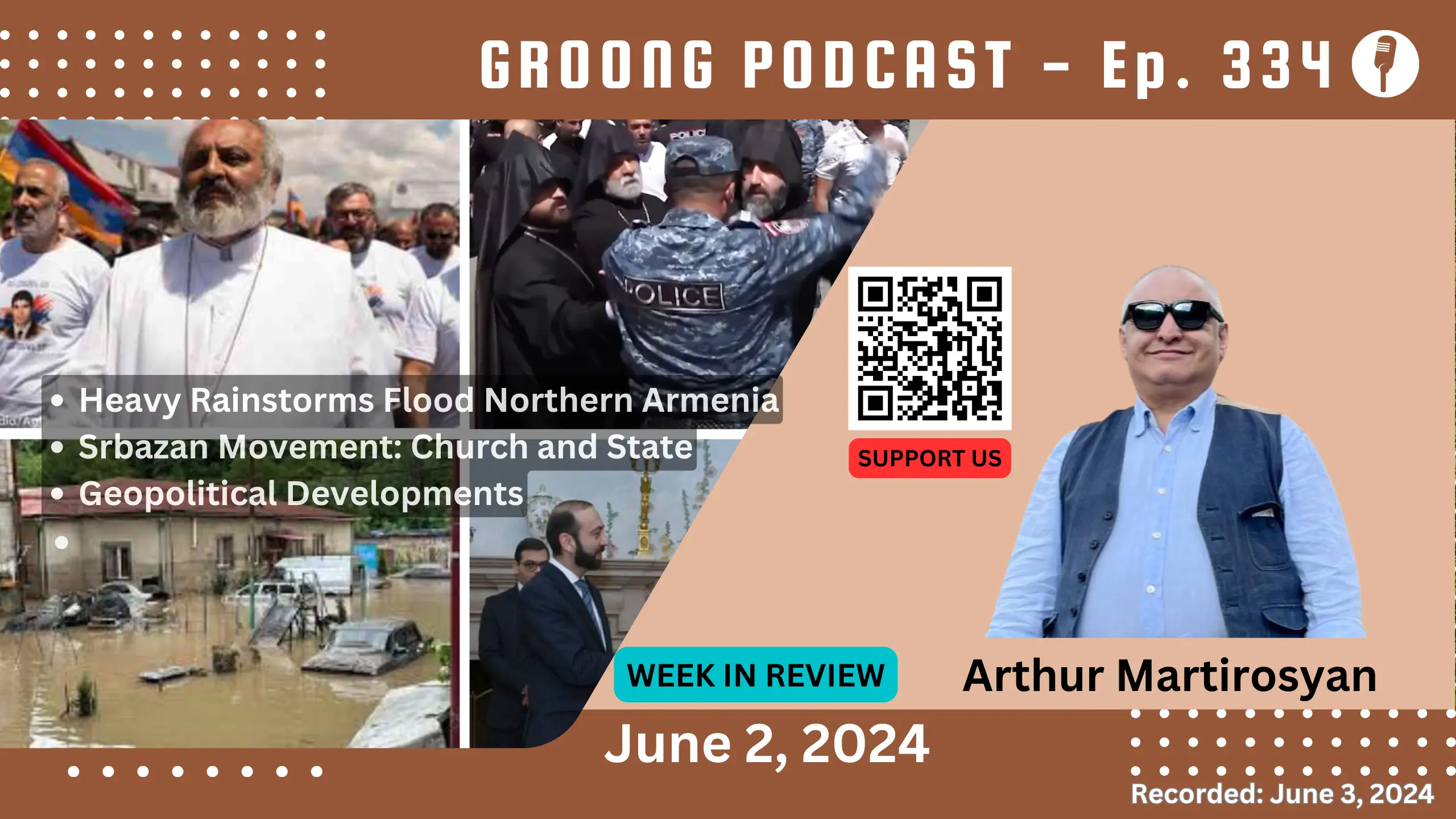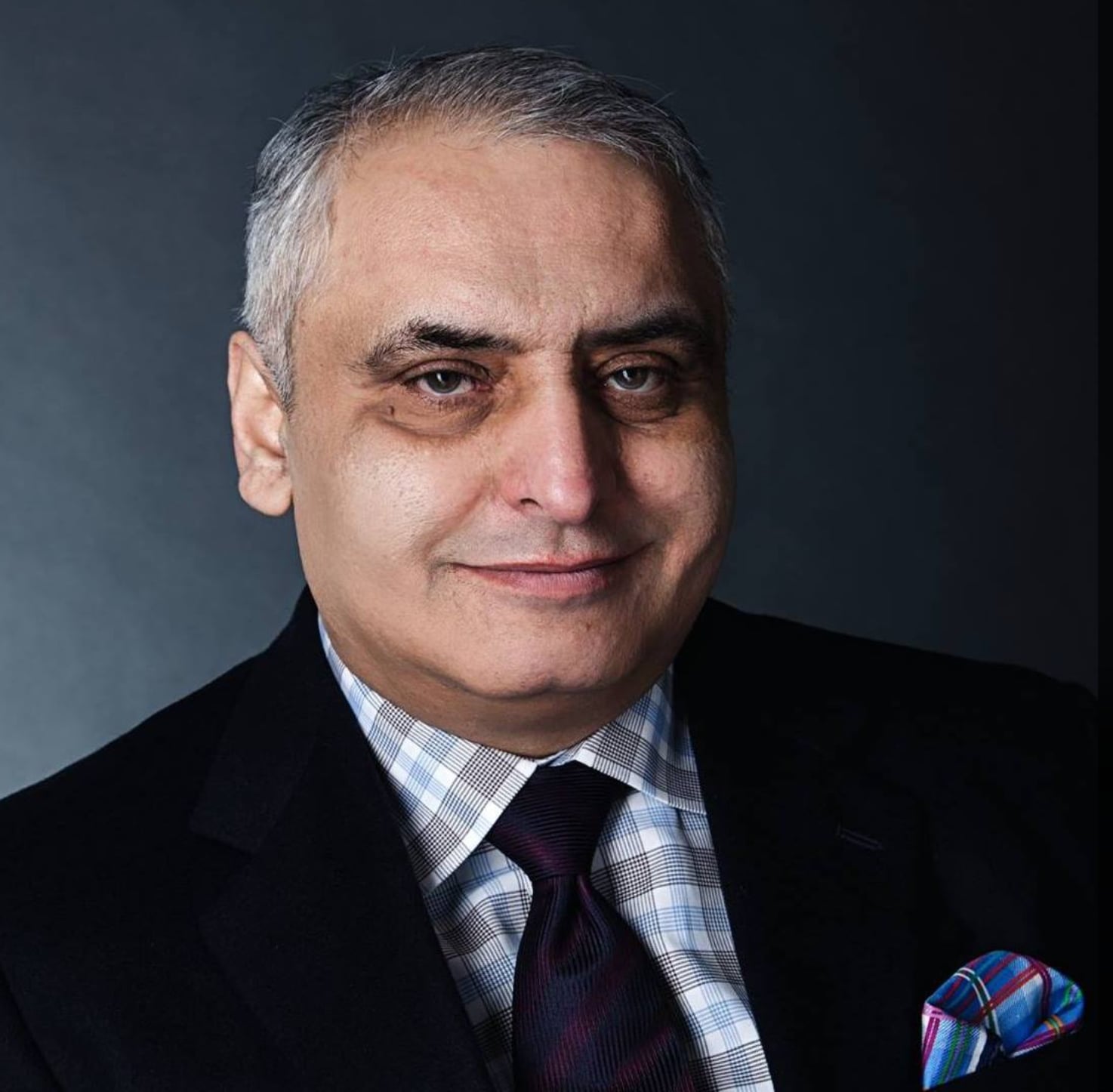
Groong Links:
Guest:
Topics:
- Heavy Rainstorms Flood Northern Armenia
- Bagrat Srbazan Movement
- Church and State
- Geopolitical Developments
- Rights and Security for Artsakh Armenians
Episode 334 | Recorded: June 3, 2024
Show Notes
Heavy Rainstorms Flood Northern Armenia
During the weekend of May 25-26, a severe rainstorm flooded large swaths of the Lori and Tavush regions in the north of Armenia. Roads and highways were flooded and closed; over a dozen bridges were damaged, stranding thousands of residents. Both national highways that lead to the Georgian border, as well as the railway were also inoperable. The death toll so far is 4 people.
After the storms passed the government declared a number of the villages and towns a disaster zone and allocated around $1 million to recovery efforts, and also called out for citizen volunteers to help, and said it would ask for international aid to help with the reconstruction.
The Russian Railway company has already started repairing the damaged railways, as reported on May 31. Iran’s acting FM Ali Bagheri Kani offered to help the affected regions recover from the floods.
Questions:
- How would you assess the government response to the floods?
- Why was Georgia able to evacuate its citizens earlier than Armenia?
Srbazan Movement; Church and State
Bagrat Srbazan vs. Pashinyan
Bagrat Srbazan continued his protest movement on the streets in Yerevan. This week, the theme of his activities was to demand answers from various ministers over injustices. On Monday, May 27 he was at the Ministry of Internal Affairs and demanded to meet with the minister, Pashinyan’s childhood school friend, Vahe Ghazaryan, in order to demand answers about police behavior towards protesters. On May 30 the protest immobilized the main Government building and Republic Square, forcing government members to leave the buildings from back entrances. On May 31st, Bagrat Srbazan’s movement surrounded the building of the Armenian MFA, demanding answers from Ararat Mirzoyan. The standoff with the police resulted in clashes, with dozens arrested, including deacons of the church.
Bagrat Srbazan also met with Gagik Tsarukyan, reportedly to discuss assistance for the flood victims of the rainstorms in the north.
Questions:
- Most of the opposition in Armenia is united in supporting Bagrat Srbazan. Where does he go from here? The movement has stated that the resignation of the current government is one of their goals. How can they achieve this?
Pashinyan vs. Church
In the afternoon of May 28, Pashinyan took revenge on Catholicos Garegin II. When the Catholicos approached the Sardarabad memorial with his entourage, he was met with 3 lines of police, supported by Pashinyan’s security detail, blocking their entrance. The embarrassing incident was recorded, and the Catholicos was eventually successful in honoring the memory of Sardarabad, independence, and offering prayers to the nation.
Pashinyan later himself chimed in about the incident, saying that his team wanted to make sure in what capacity the Catholicos was planning on being at Sardarabad. Whether he was planning on simply laying flowers and praying, or whether the Catholicos would conduct “disruptive and provocative” actions like Bagrat Srbazan. Pashinyan also accused the Catholicos of directing Bagrat Srbazan’s movement.
Questions:
- What are your thoughts about this development?
- Regardless of the disagreements, is it a good idea for Pashinyan to attack the church so openly?
Geopolitical Developments
Armenia - Azerbaijan “Peace Treaty”
Objective facts are:
- Armenian POWs are still in Baku
- Azerbaijan is H traces of Armenians in Artsakh
- Azerbaijan will get enclaves inside Armenia, if the logic of 1976 maps is extended
- Azerbaijan demands a corridor through Armenia
- Azerbaijan says that Armenia must change its constitution
- Azerbaijan is sponsoring “Western Azerbaijan” concept
- Aliyev has demanded that Armenia recognize and apologize for the so-called “Khojaly Genocide”
- We’re not even talking about the “return” of Azerbaijanis to Armenia
Yet, Pashinyan this week downplayed major differences, saying that “The key principles are agreed upon, we just need to reproduce that in the text of the peace treaty”.
What we know is that Pashinyan has agreed to exclude the demarcation and delimitation as well as the status of Artsakh.
Questions:
- What will a neutered “Peace Treaty” give Armenia?
Pashinyan’s buzzword is legitimacy. He says that a peace treaty will give Armenia “legitimacy”.
Questions:
- What is this intangible legitimacy that he’s talking about?
The Rights and Security of Artsakhtsis
Vardan Oskanian, former FM of Armenia, says that even in this situation there is a solution for the rights of Artsakhtsis. Yet, he doesn’t reveal his cards.
Question:
- As a negotiator, what is in the realm of the possible in terms of the rights and security of Artsakhtsis?
Wrap-up
That’s our Week in Review, we hope you found it helpful. We invite your feedback and your suggestions, you can find us on most social media and podcast platforms. Thanks to Laura Osborn for the music on our podcasts.
Guests

Arthur G. Martirosyan
Arthur G. Martirosyan is a Senior Consultant with CM Partners. In 1994, after graduating from Yale University, he joined Conflict Management Group and Harvard Negotiation Project, and has since worked on conflicts in the former Soviet Union, the Middle East, the Balkans, Africa, and Latin America.
Hosts

Hovik Manucharyan
Hovik Manucharyan is an information security engineer who moved from Seattle to Armenia in 2022. He co-founded the ANN/Groong podcast in 2020 and has been a contributor to Groong News since the late 1990s.
Disclaimer: The views expressed by Hovik Manucharyan on the ANN/Groong podcast are his own and do not necessarily reflect the opinions of his employer or any other organization.

Asbed Bedrossian
Asbed Bedrossian is an IT professional, and for years oversaw the central IT enterprise infrastructure and services at USC. His decades of experience spanned across IT strategy, enterprise architecture, infrastructure, cybersecurity, enterprise applications, data center operations, high performance computing, ITSM, ITPM, and more.
Asbed founded the Armenian News Network Groong circa 1989/1990, and co-founded the ANN/Groong podcast in 2020.